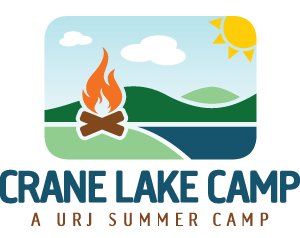by Shaina Morrel and Noam Watt, 2nd Year Olim Fellows
In the midst of our crazy first semesters at college, it felt like a nuisance to go to middle of nowhere Georgia for a weekend. Little did we know that those 4 days would change us. The theme of the retreat was “human rights and social justice.” Yet, those words don’t even come close to what this weekend meant to us. This weekend was joyous, meaningful, inspiring, and important.
Our first night in Atlanta, we were taken back to the Lincoln Memorial in the summer of 1963. Well, not quite, but close. Stephon Ferguson is the only person who is allowed to give Dr. Martin Luther King’s speeches in his voice, and we had the unique opportunity to hear him speak to us in an intimate setting. Stephon delivered MLK’s most famous speech, I Have a Dream, and it felt like we were right there, surrounded by 250,000 other people, listening to the Reverend speak words of love and coexistence that we still struggle with today. Hearing this speech in King’s voice, rhythm and accent, brought goosebumps to all of us in the audience. Let freedom ring, we heard King preach, transforming oppression into an oasis of freedom and justice. We felt the weight of King’s words, words that echo way too accurately to today, in the wake of Pittsburgh, and Thousand Oaks, and Orlando, and Las Vegas, and Charleston…and the list goes on. If King were alive, he would ask, “when will this stop?” As we settled into our Kallah, we were ready to take this experience, and build from it.
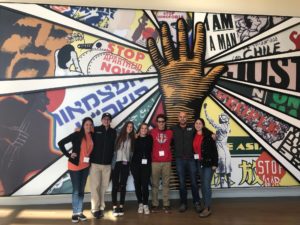
The next day, we visited the National Center for Civil and Human Rights Museum. The lower floors were physically and symbolically dark, hitting us with the gruesome brutality and cruelty of humankind. One of the most impactful experiences in the museum was a simulation of a non-violent lunch counter sit-in. As we sat at the diner booth, put our hands flat on the counter, and closed our eyes, we were instantly thrown back to the 1960’s. Voices yelling, glass smashing, chairs shaking… many of us left crying and unable to focus for several minutes after. We felt and heard exactly what it would have been like; it was beyond anything we had ever experienced before.
We made our way to the upper floors where we were greeted with bright colors, light, and a strong sense of hope after such a heavy beginning. We interacted with an exhibit about human rights that demonstrated small acts that can be done by any individual in a matter of 1 minute, 1 hour, or 1 day. We know that our actions won’t easily fix these problems, but if every person does one small piece, there will be progress. Even as we saw the progression from the bottom to the top of the museum, we were all still aware of how much further our world still has to go. At one point another Olim Fellow said aloud, “It is unfortunate because the people who come to these museums are the ones that are already doing good and don’t necessarily need to hear it.” All in all, we are blessed to be part of a Jewish community that always stands up and does the right thing to help make our world a better place. As we know from camp’s mission statement, “you (we) are not required to finish the task, yet you (we) are not free to desist from it.”
For both of us, one of the most impactful experiences came that afternoon at F.L. Stanton, an elementary school in an under-resourced neighborhood of Atlanta that has strong connections with NFTY and URJ Camp Coleman. Wearing our matching bright orange t-shirts, we entered the school having absolutely no idea what to expect. The task was to assist in K-5 classrooms, and at first it was awkward… we stood there, unsure of what role to take on. Many of us felt uncomfortable with even the thought of a group of white kids coming to help and fix things. Soon enough, though, the kids acted as if we had known them forever, yet at the same time, as if they had never met a white person in their lives. They were captivated by our hair, rubbed our skin, held our hands. One even asked me to smile because she wanted to know if I had gold teeth. More than the physical aspects, they wanted to know everything about us. The funniest was them trying to guess our ages; who knew college aged us so much that we looked 36 already!
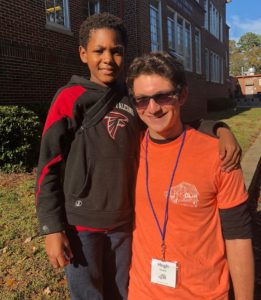 In just our hour or so with them, we saw both challenges and successes. On one end of the spectrum it was astonishing to see the way the teacher treated the students. We observed one teacher discipline a student in a surprisingly aggressive way. Yet, on the other end of the spectrum, clear educational values were present. For example, when one student accidentally knocked over a tower, they all repeated in unison, unprompted: “mistakes are how we learn.” The school needed work. That was for sure. But it was beyond clear that this school was doing everything that they could to prepare their students for the challenging world they would soon be entering. Again we felt the theme that while we can’t do everything, we must do our small part. At F.L. Stanton we experienced a way of life none of us had ever been exposed to, and we left inspired to help in whatever way possible to ensure the best lives and futures for all people regardless of race, ethnicity, socioeconomic position, religion, or any other difference. At the core, they are just kids, and we are all just human.
In just our hour or so with them, we saw both challenges and successes. On one end of the spectrum it was astonishing to see the way the teacher treated the students. We observed one teacher discipline a student in a surprisingly aggressive way. Yet, on the other end of the spectrum, clear educational values were present. For example, when one student accidentally knocked over a tower, they all repeated in unison, unprompted: “mistakes are how we learn.” The school needed work. That was for sure. But it was beyond clear that this school was doing everything that they could to prepare their students for the challenging world they would soon be entering. Again we felt the theme that while we can’t do everything, we must do our small part. At F.L. Stanton we experienced a way of life none of us had ever been exposed to, and we left inspired to help in whatever way possible to ensure the best lives and futures for all people regardless of race, ethnicity, socioeconomic position, religion, or any other difference. At the core, they are just kids, and we are all just human.
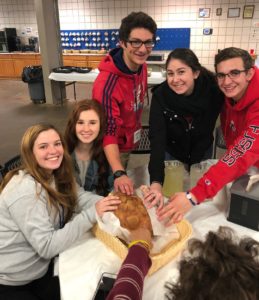
Next we journeyed up north to URJ Camp Coleman in Cleveland, Georgia. We certainly felt we were in the south; the hospitality we were greeted with, the rolling hills, cows feeding in massive pastures, and the late-setting sun that welcomed us to our home for the weekend, deep in the hills of northern Georgia. Camp Coleman served some bangin’ grits and biscuits, fried chicken, and legendary “Apple Brown Betty” crumble, making us eager to wake up at 7:30 the following morning, even without hearing Debby’s “Boker Tov, CLC!”
On Shabbat, we were inspired by two emotionally impactful teachers, with very different messages. First, we were lucky to welcome Sandy Roberts, an educator at the school in Whitwell, Tennessee who began the Paper Clips Project. In a school with nearly no diversity, Sandy was determined to teach her students about other communities and give them some perspective about the world beyond their small southern town. A Holocaust curriculum evolved into the project to collect six million paper clips, one for each of the Jews killed, and eventually established a Holocaust Children’s Memorial in the school. Sandy brought us through her story: from the valleys of struggling to receive any paper clips at the start of her project, to the peaks of having national news visit her classroom. She described her life-altering trip to Jerusalem just a few weeks ago to visit Olivia, the author of a memoir that Sandy teaches at the core of her curriculum. During the Holocaust, Olivia lost her father to the hands of the Nazis, illustrated in a tragic moment in the book that brought the class “jocks and cheerleaders into their parents laps, sobbing.” Holding Olivia’s hand, Sandy uttered, “The more I learn, the less I know.”
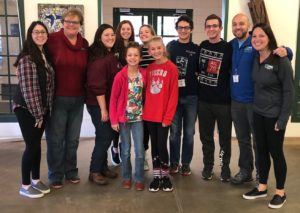 The major point that Sandy emphasized through her story was the importance of 1+1=2. Taking one second, and helping just one person could mean a world of difference. We translated this to our work at camp; taking the extra minute even if that means being late to an activity, or putting the extra work and time into one camper who really needs you. As their counselors, we are helping to shape them into the future leaders of our world.
The major point that Sandy emphasized through her story was the importance of 1+1=2. Taking one second, and helping just one person could mean a world of difference. We translated this to our work at camp; taking the extra minute even if that means being late to an activity, or putting the extra work and time into one camper who really needs you. As their counselors, we are helping to shape them into the future leaders of our world.
Our second inspiring speaker was an educator named Brad Cohen. He attended Jewish camp as a kid, won the Georgia Teacher of the Year early in his career, and has been living with Tourette’s syndrome through it all. Brad spoke to us about never knowing a person’s story, and how we can translate this to camp- through adapting to individual campers’ needs, to modifying the way we react to situations, and treating everyone B’tzelem Elohim, equally special in the image of God. Brad’s self-advocacy has impacted not only his own life, but those of his peers and his many elementary school students. At the end of his session, we asked Brad how it felt when just last month Donald Trump mocked a reporter with a physical disability, or when Kim Kardashian used the “r-word” without even thinking about it. Brad said that we have to use this hate and turn it into something meaningful. We have to educate, care, and dream big. We can’t let others bring us down, and Brad has done just that. Hearing his story, and seeing his perseverance inspired us to create new strategies to be more patient with campers who have differing abilities, and make our camp community a more welcoming, wholesome place.
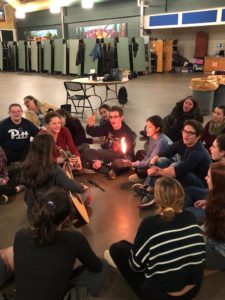 We wrapped up our time at Camp Coleman with some QTD- “Quality Time with the Directors.” We played Heads Up for hours, laughed, reflected on Summer 2018, and looked towards next summer in the bubble. Our cohort of fellows, plus Mom and Dad (often referred to as SJL and Brett) brainstormed ways we could take our knowledge from this weekend, and translate it into the bubble. SJL taught us a guiding framework for thinking about all the behind-the-scenes actions at camp. With all of this information and ideas at our fingertips, we outlined strategies for improving staff week, our safety protocols, Limud activities, and the ways we can inspire the next generation of leaders at camp. These ideas permeated in our heads as we made our way back to Atlanta, bags and brains filled with inspiration, determination, empowerment, and a readiness to make a difference in the world. Human rights and social justice are fundamental to Judaism, and it is our work as the Olim Fellows and rising Jewish leaders to use what we learned this weekend to our 10 months at college and our 2 months at camp.
We wrapped up our time at Camp Coleman with some QTD- “Quality Time with the Directors.” We played Heads Up for hours, laughed, reflected on Summer 2018, and looked towards next summer in the bubble. Our cohort of fellows, plus Mom and Dad (often referred to as SJL and Brett) brainstormed ways we could take our knowledge from this weekend, and translate it into the bubble. SJL taught us a guiding framework for thinking about all the behind-the-scenes actions at camp. With all of this information and ideas at our fingertips, we outlined strategies for improving staff week, our safety protocols, Limud activities, and the ways we can inspire the next generation of leaders at camp. These ideas permeated in our heads as we made our way back to Atlanta, bags and brains filled with inspiration, determination, empowerment, and a readiness to make a difference in the world. Human rights and social justice are fundamental to Judaism, and it is our work as the Olim Fellows and rising Jewish leaders to use what we learned this weekend to our 10 months at college and our 2 months at camp.
We said our final goodbyes at the airport, excited for when we will gather together in Philadelphia. There, we will flesh out our ideas, and create a plan for how we can inspire our campers to have a dream, take one second for one person, and turn that dream into a better reality for all of us.
Noam Watt is from Lexington, Massachusetts and is currently a freshman at UConn, where he is an undecided major. Summer 2019 will be his 9th at Crane Lake! Noam is a huge sports fan, is very passionate about social justice issues such as making our community welcoming for individuals with disabilities, and can’t wait to be back in the bubble!
Shaina Morrel is from Sterling, Massachusetts and is currently a first year student at The George Washington University in Washington, DC majoring in International Affairs and minoring in Judaic Studies. Shaina has attended camp since 2009, and this upcoming summer will be her 9th. She hopes to someday make a difference in this world starting “one bunk at a time.”
